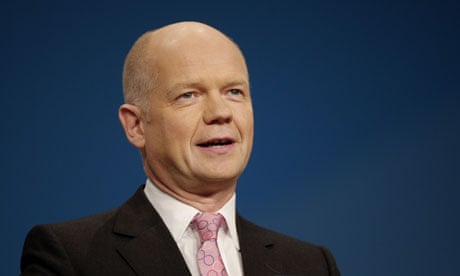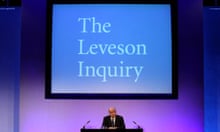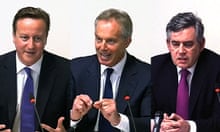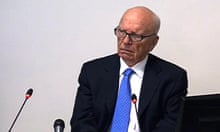Statutory controls on the British press would send an "appalling message" abroad and encourage some of the most illiberal regimes in the world, the foreign secretary, William Hague, will be warned ahead of a landmark report that could usher in a new era of newspaper regulation.
However, the claim was rejected by campaigners for greater regulation, who say such a move is supported by the majority of the public.
The World Press Freedom Committee (WPFC), which campaigns against limitations on the press, has written to Hague, Justine Greening, the international development secretary, and Richard Ottaway MP, chairman of the foreign affairs select committee, in advance of the publication of Lord Justice Leveson's report on Thursday.
In the letter, Ronald Koven, the European representative of the WPFC, warns that a "chill will go through the world's media – matched by a warm glow in the ministries of some of the most illiberal regimes," if the Leveson report recommends legislation. He says editors around the world have contributed to a WPFC report making the case against state regulation.
Fred M'membe, editor of the Zambia Post, who this year was imprisoned for an unfounded allegation of criminal defamation, told the report's author, former regional newspaper editor Ian Beales, that statutory controls in Britain would "spread through Africa like a firestorm". Raymond Louw, a former South African editor and campaigner for press freedom, said: "Dictatorial governments would leap at anything repressive enacted in Britain as justifying their conduct."
Koven warns Hague: "One shudders to think how any recommendations for a statutory or quasi-statutory regulatory regime which the Leveson inquiry might recommend could be exploited in any number of countries with far weaker press freedom records, including in the Commonwealth."
The letter is backed by the Free Speech Network, a body representing media interests including the Newspaper Publishers Association, of which Guardian News & Media, owner of the Observer, is a member.
However, supporters of statutory control, notably the campaign group Hacked Off, set up following the phone-hacking scandal at the News of the World that led to the Leveson inquiry, say regulation is long overdue.
"The editors from overseas can be reassured that the problems in this country are the opposite of what they experience," said Evan Harris, associate director of Hacked Off. "We have seen industrial-scale intrusion and surveillance of ordinary members of the public, widespread corruption of the police and political system, and a conspiracy to cover it up – not by individual democratic voices like these African editors, but instead by large media corporations wielding anti-democratic power."
Harris said those calling for an end to self-regulation were not seeking to muzzle the press. "We are seeking an independent system of regulation of a code of conduct, similar to the existing industry one, which is backed by law to make it independent and to prevent large publishers walking out of the system," he said. "The vast majority of the British people, polls show, support that independent prescription."
The report is described as "voluminous", suggesting the extent of its findings and recommendations will take days to digest. Many believe it will propose a "statutory underpinning" of newspapers which would see the creation of a new regulatory body formally recognised in law. It is thought this would include a legal requirement for newspapers to sign up to the body, similar to the licensing system that governs broadcasters.
But there is confidence among critics of press laws within the government, including cabinet ministers, that he will seek to avoid legislation, should it be proposed. The prime minister is said to have privately signalled some sympathy with a model of regulation proposed by Lord Hunt, the current head of the Press Complaints Commission, in which newspaper editors would be contractually obliged to work within certain standards.
Such a new regulator would have the power to fine newspapers up to £1m for serious editorial breaches, and has been billed by its champions as a significant break from self-regulation of the past.
Angie Bray, the Tory MP for Ealing Central and Acton, who is an opponent of the state becoming involved in press regulation, said: "A new independent regime may be the solution to the problem that we cannot be seen to be bringing in no changes at all, but keeps people like me happy who are against the state wading in with regulation."





